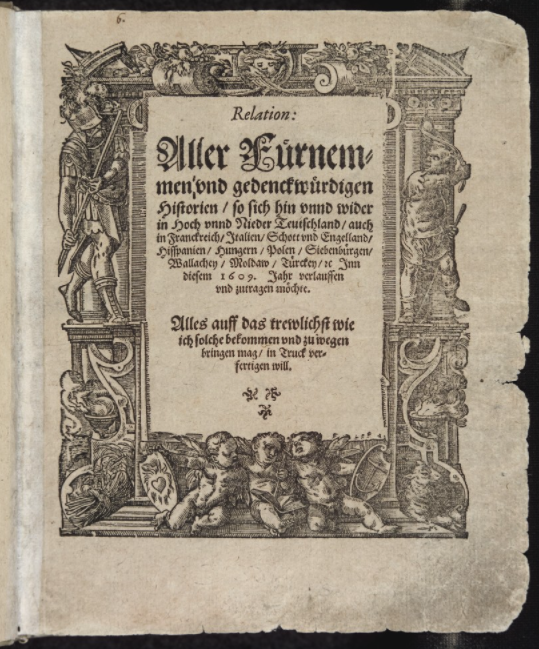The birth of the first newspaper was influenced by several key members of society in the 17th century. The Renaissance which took place from the 14th to the 17th century promoted an increase in demand for written materials and overall information in the growing middle classes who didn't have as much access to information at the time. The earlier invention of the printing press in the 1400's made printing written publications possible for mass production setting the stepping stones for the invention of the newspaper.
 |
| Johann Carolus |
From 1618-1648 the Thirty Year's War, a war between Catholic and Protestant states, occurred in central Europe creating a greater need for a means of communication with citizens. This war also led both Catholic and Protestant states to shape public opinion by utilizing printed pamphlets and news sheets.
"Account of All Distinguished and Commemorative News," written in German language was printed in 1605 in Strasbourg France. This was printed by Johann Carolus who obtained a license granting him the ability to be the first to print regular weekly newspapers. Later on in 1659, Carolus published the "Relation" which is recognized as the first newspaper in the world by the World Association of Newspapers.
 |
| 1609 edition of Carolus's Relation |
In 1695 the Continuation Bill passed without the renewal of the Licensure Act. This allowed copyright and pre-publication censorship to expire. Once press censorship laws were lifted and printing technology advanced newspapers flourished like never before.
Prior to the invention of newspapers people typically received their information through word-of-mouth. This made it difficult to gather information as it only spread so fast resulting in little to no information on important matters. Newspapers revolutionized our means of communication by providing regular printed publications that had the power to rapidly disperse news to a wide range of people. In fact, the concept of "public opinion" stemmed from the introduction of newspapers. Writers were able to express opinions and analyze current events ultimately allowing readers to form their own opinions on topics written about. It became very apparent that newspapers began to influence public opinion and have positively impacted the development of our society. This allowed citizens to become more educated and informed which increased engagement within our government as well as important breakthroughs regarding science, art, economics, and more.
Not only did the newspaper contribute to a new form of communication itself but it was also a precursor for contemporary mass media forms including radios and television sparking inventions in photography as well as other communication technologies.




No comments:
Post a Comment